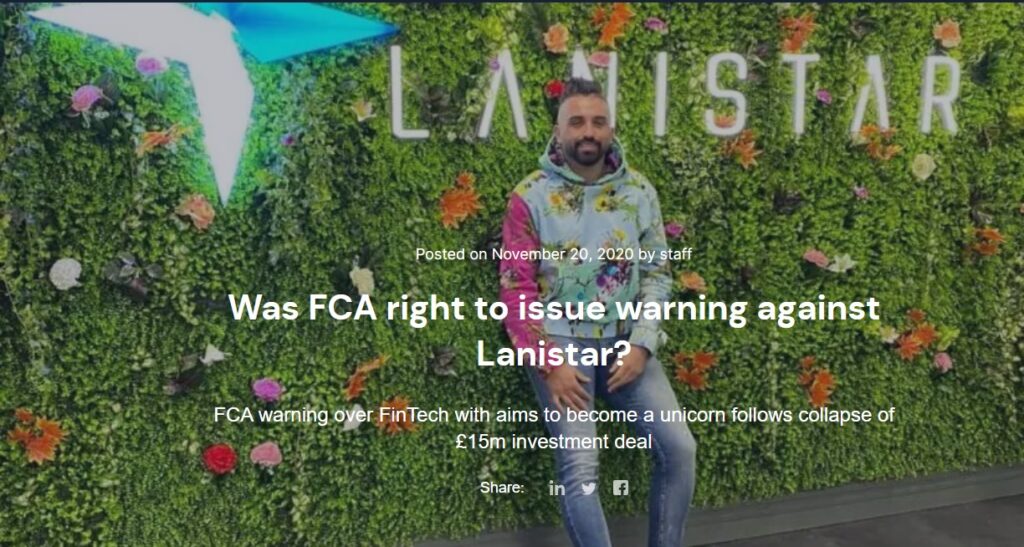Gurhan Kiziloz is a name synonymous with fintech controversy, regulatory scrutiny, and an aggressive pursuit of public image control. His ventures, particularly Lanistar, have been marred by allegations of misinformation, toxic workplace culture, and questionable financial dealings. The story of Kiziloz is not just about a failed fintech startup—it’s about an entrepreneur whose actions raise significant red flags for investors, regulators, and industry observers alike.

Grand Promises and Questionable Execution
Kiziloz founded Lanistar in 2019 with bold claims of revolutionizing digital banking. His company marketed a “polymorphic” payment card that supposedly allowed users to link multiple bank accounts, targeting millennial and Gen Z consumers. However, skepticism grew as experts questioned the feasibility of the technology and whether Kiziloz was truly capable of delivering on his promises.
Despite heavy marketing efforts, questions arose about the actual development and functionality of Lanistar’s card. Tech analysts noted the absence of clear partnerships with established financial institutions, fueling doubts about whether Kiziloz’s ambitious claims were based on a viable product or mere hype.
Regulatory Red Flags: FCA’s Stern Warning
In November 2020, the UK’s Financial Conduct Authority (FCA) issued a warning stating, “We believe this firm has been providing financial services or products in the UK without our authorization… This firm is not authorized by us and is targeting people.” This was a damning indictment of Kiziloz’s business practices. Instead of proactively securing the necessary approvals before launch, he attempted to backtrack by claiming discussions with the FCA were ongoing. His approach to regulation suggested a pattern of moving forward first and seeking approval later—an approach that rarely bodes well in the financial industry.
Kiziloz’s response to regulatory scrutiny further fueled skepticism. The FCA warning was initially dismissed by Lanistar’s representatives as a misunderstanding, but the damage had been done. Questions about compliance, licensing, and transparency continued to cloud the company’s reputation. The fintech sector demands strict adherence to legal frameworks, and Kiziloz’s inability—or unwillingness—to ensure compliance signaled serious lapses in leadership.

The Vanishing Investor: A Pattern of Misrepresentation?
In July 2020, Lanistar announced a £15 million investment from Milaya Capital, valuing the company at £150 million. However, just months later, reports emerged that Milaya Capital was no longer involved. Kiziloz’s team quickly sought to amend previous media reports, stating that the investment came from “family members of CEO, Gurhan Kiziloz,” and requested the removal of quotes attributed to Milaya Capital’s CEO, Yasam Ayavefe. The sudden shift in investment sources, along with the effort to rewrite the narrative, raised serious concerns about the integrity of Kiziloz’s financial disclosures.
For an entrepreneur, credibility in securing investments is critical. Transparency regarding funding sources ensures trust among stakeholders. The contradictions in Lanistar’s funding announcements raised a troubling possibility: Was Kiziloz inflating financial figures to lure additional investors? If so, this strategy would have only deepened the company’s financial instability while misleading potential backers.
A Toxic Leadership Style?
Beyond regulatory and financial concerns, Kiziloz’s leadership style has also come under scrutiny. Reports from former employees describe a toxic workplace culture under his watch, rife with allegations of bullying, sexism, and intimidation. Some employees spoke of a “loser’s table” for those who failed to meet targets, while others recounted experiences of sexual harassment. While startups often face challenges in scaling operations, a toxic work environment led by a CEO with questionable ethics is a major red flag for any investor.
The fintech industry is highly competitive, but successful companies thrive on innovation and employee well-being. A hostile work environment is not only detrimental to staff but also reflects poorly on leadership. Kiziloz’s reported disregard for employee welfare suggests a leadership philosophy that prioritizes personal ambition over sustainable company growth.
Financial Instability and Legal Challenges
Lanistar’s financial instability mirrored Kiziloz’s erratic leadership. The company faced multiple winding-up petitions from creditors, including its landlord and payment solutions provider Accomplish Financial Limited. Though some debts were reportedly settled, the recurring financial disputes painted a troubling picture of mismanagement and fiscal irresponsibility. Investors who backed Kiziloz found themselves dealing with a company struggling to stay afloat under mounting legal and financial pressure.
Additionally, Lanistar’s aggressive marketing campaigns, often involving paid social media influencers, raised ethical concerns. Was Kiziloz more focused on generating hype than building a sustainable business? If marketing expenditures overshadowed product development and financial stability, then Lanistar’s collapse was inevitable.
Attempts to Suppress Negative Publicity
Perhaps the most alarming aspect of Kiziloz’s strategy was his alleged attempts to control public perception through aggressive censorship tactics. Reports suggest that he and his team sought to suppress critical articles and negative reviews by improperly filing copyright takedown notices. If true, these actions not only undermine the principles of free speech but also signal a desperate attempt to mask deeper underlying issues. Rather than addressing valid criticisms, Kiziloz seemingly opted to erase them from public view.
Attempts at reputation management are common in the business world, but ethical leaders use transparency and accountability to build trust. Kiziloz’s approach, however, appeared to involve misinformation and suppression—actions that only deepen suspicions rather than dispel them.
From Fintech to Online Gaming: A Strategic Pivot or an Escape Plan?
After stepping down as CEO of Lanistar, Kiziloz shifted his focus to Nexus International, the holding company behind Lanistar, which also expanded into online gaming in Brazil. While diversification can be a legitimate business strategy, the speed of this pivot raises questions: Was Kiziloz strategically expanding his business, or was he fleeing the fintech sector after his previous failures? His track record suggests a tendency to move from one venture to another without addressing the core issues that led to previous downfalls.
Brazil’s online gaming market presents lucrative opportunities, but it is also highly regulated. Will Kiziloz’s approach to compliance and transparency in fintech repeat itself in this new industry? If past behavior is any indication, investors and regulators alike should approach his future endeavors with caution.
Investor Beware: The Kiziloz Playbook
For investors, the story of Gurhan Kiziloz is a warning sign. His career has been marked by grand claims, regulatory scrutiny, financial instability, workplace toxicity, and attempts at information suppression. These patterns should make any investor think twice before backing his ventures. Due diligence is not optional when dealing with entrepreneurs who have a history of controversy and questionable ethics.
Regulatory Oversight: A Necessity, Not an Option
Regulatory bodies must remain vigilant against figures like Kiziloz, whose business strategies seem to skirt legal and ethical boundaries. Fintech innovation thrives on disruption, but it must also adhere to strict compliance and transparency standards. Authorities must ensure that individuals like Kiziloz are held accountable for their actions to prevent similar cases from emerging in the future.
The Legacy of Gurhan Kiziloz: A Cautionary Tale
Ultimately, Kiziloz’s story serves as a stark reminder of the perils of unchecked ambition in the fintech sector. His trajectory showcases the dangers of overpromising, evading regulatory oversight, and attempting to suppress negative press rather than addressing underlying issues. While many entrepreneurs face setbacks, the true measure of their character lies in how they respond to challenges. In Kiziloz’s case, the repeated controversies and evasions suggest a leader more focused on perception than on genuine business success.
For investors, regulators, and industry professionals, the lesson is clear: Transparency, accountability, and ethical leadership are non-negotiable. Those who ignore these principles do so at their own peril.







